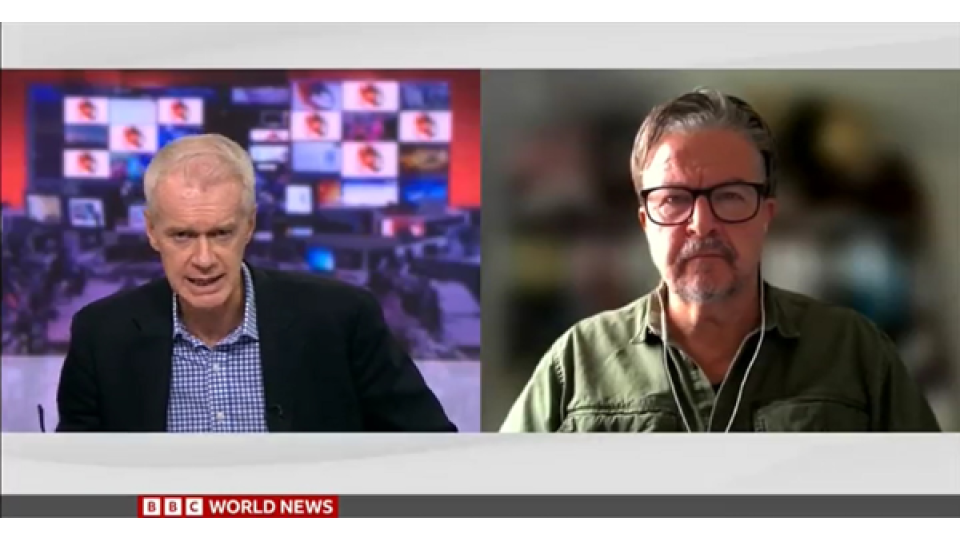ICN calls for stronger codes for ethical recruitment of nurses and investment in nursing education

Several BBC news outlets have recently reported on the over-reliance of many high-income countries on foreign-trained nurses, quoting the International Council of Nurses’ (ICN) warning that the shortage of healthcare workers is the greatest threat to global health. According to a BBC analysis of data from NHS Digital, the share of healthcare staff recruited from overseas has almost doubled between 2014 and 2021.
Stephen Sackur, a BBC World News anchor, interviewed Howard Catton, ICN Chief Executive Officer on 5 August, asking whether controls needed to be “put on the ability of rich nations to poach nursing staff” from developing nations.
Mr Catton replied that lower income countries should invest in the salaries and conditions of their own health workforce and that higher income countries should become more self-sufficient. He added,
“We had six million shortage of nurses before the pandemic. As you've said, that's increased as a result of the pandemic, but as well as having this shortage in health workers, we have this huge increase in demand, not just because of the pandemic, but our aging societies, chronic diseases as well. So this imbalance is driving this recruitment, particularly high-income countries...often recruiting from low- and middle-income countries [which] start from a lower base in terms of the numbers of nurses that they have per head of population, which means that if they lose their nurses, it can have a significant impact on their ability to deliver healthcare to their own people.”
Mr Catton pointed out that lower income countries have invested in educating and training the nurses that are then being poached.
“If this was climate change, we'd say, ‘How can we offset the impact when we know it's going to have a detrimental effect elsewhere?’ We could do something like that with nursing. Say, if you're going to recruit nurses from a low-income country, pay for a nursing school in that country, for example.”
Mr Catton expanded on this in an interview with the BBC’s Joanna Gosling, saying:
“I don't think that the ethical codes that exist have sufficient teeth. I don't think that we're monitoring the numbers sufficiently. There are shortages in India and the Philippines. It's not as though those countries have more nurses than they need. They've got issues in meeting their own health needs.
The UK hasn't been educating enough nurses in many, many years... Not only is it a deliberate choice not to educate enough, you are then outsourcing the costs of that to other countries because it's other countries who paid for that education.”
In June this year, the Royal College of Nurses in the UK reported a ten-fold increase in nurse recruitment from ‘red list’ countries. RCN General Secretary and Chief Executive, Pat Cullen, said:
“Ministers are overly reliant on nurses from countries with critical workforce shortages. Meanwhile, their lack of investment in UK nursing staff – both today’s and those of the future – is deeply concerning.”
Red list countries are those facing the most pressing health workforce shortages and which have been identified as having serious workforce challenges and must not be targeted for active recruitment.
The UK is not the only country recruiting overseas nurses. According to the ICN report COVID-19 and the international supply of nurses:
“550,000 foreign trained nurses are working across the 36 high-income OECD member countries (up from 460,000 in 2011). This includes 197,000 nurses in USA, 100,000 in the UK, 71,000 in Germany, and 53,000 in Australia.”
ICN has been calling for many years for the serious issue of the lack of nurses and the over-reliance on foreign-trained nurses to be urgently addressed, and has heightened its calls due to the effect of the pandemic.
In their January 2022 report ‘Sustain and Retain in 2022 and Beyond’, Howard Catton, Professor James Buchan and Dr Franklin Shaffer revealed how the COVID-19 pandemic has made the fragile state of the global nursing workforce much worse and suggesting up to 13 million more nurses will be required over the next decade.
“There is emerging evidence of increased active and ‘fast track’ international recruitment by some high-income OECD countries, which could undermine the ability of some ‘source’ countries to respond effectively to pandemic challenges. The pandemic has heightened the risks associated with international recruitment: cutting across international supply to some high-income ‘destination’ countries, in the short term, whilst driving up ‘push’ factors and likely outflow from low-income ‘source’ countries.”
In June 2022, ICN reported that the alarming rise in the number of nurses taking strike action across the world is a direct response to governments’ failure to tackle the root causes of severely weakened and, in some cases, collapsing healthcare systems, saying:
“One of the fundamental root causes is the global shortage of nurses, which is putting unsustainable pressure on the nurses currently working in healthcare systems that have been disrupted by staff shortages, the COVID-19 pandemic and historical chronic underfunding.”
At the May 2022 World Health Assembly, ICN pleaded for governments to “monitor and report on recruitment practices and ensure compliance with the WHO Code of Practice and invest in nursing education with the aim of greater self-sufficiency in the supply of nurses.”
ICN’s position statement on international career mobility and ethical nurse recruitment “supports the rights of nurses to pursue professional achievement through career mobility and to better the circumstances in which they live and work” but “condemns the targeted recruitment of nurses from countries or areas within countries that are experiencing a chronic shortage of nurses and/or a temporary health crisis in which nurses are needed” and “acknowledges the adverse effects that international migration of nurses and other health professionals may have on healthcare quality in countries seriously depleted of their nursing workforce.”
Download the communique here